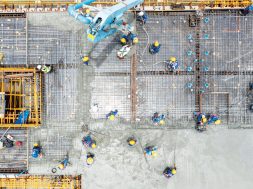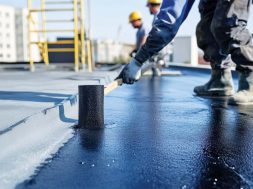Concrete Becoming TechCrete

This story discusses the advancements in the concrete industry and how ready-mix concrete has revolutionised the construction industry in the last two decades. It explores how recent innovations such as automated batching systems, utilisation of AI algorithms, deployment of the Internet of Things (IoT), implementation of GPS tracking systems, and introduction of non-destructive testing methods have enhanced precision, reduced the scope for human errors, and improved accuracy in concrete technology. The story also analyses how the introduction of ready-mix concrete (RMC), high-performance admixtures, and supplementary cementitious materials (SCMs) has helped produce high-strength concrete more efficiently, improving workability and reducing labour requirements during placement.
Compared with other construction materials, concrete stands out in strength, durability, and energy efficiency. Concrete is preferred because of its versatility, environmental friendliness, cost-effectiveness, and water-resistant nature. With a focus on building stronger and more durable structures and ascertaining the sustainability of projects, technological advancements in concrete production are needed.
Technological innovations in the concrete industry
Automation and digitalisation include the implementation of automated batching systems for precise weighing and mixing of raw materials, development of digital management systems for processes such as invoicing, dispatching, and inventory control, integration of Building Information Modeling (BIM), use of AI algorithms for optimising delivery routes, implementation of machine learning models, deployment of IoT sensors, development of remote operation capabilities, introduction of high-performance admixtures, development of self-consolidating concrete, and implementation of GPS tracking systems. The advancements have helped reduce human errors, improved accuracy and consistency, streamlined operations, and ensured quality control. Implementing GPS trackers has enabled real-time monitoring of transit mixers, quick response to breakdowns, and increased operational efficiency and customer satisfaction.
Ultrafine materials
When added to concrete, Ultrafine materials can significantly improve its performance. These materials include calcinated bauxite, crushed quartz, limestone fillers, silica fume, and steel aggregates. They are developed from fly ash, GGBS, and micro silica, which are about ten times finer than cement particles. Incorporating ultrafine materials in concrete offers several benefits, including improved strength by filling microvoids in concrete, enhanced durability through reduced permeability, sustainability by utilising industrial by-products, cost-effectiveness, and better workability for easier placement.

Ready-mix concrete
Ready-mix concrete, or RMC, is a customised concrete developed based on specified standards. RMC finds application in several construction projects, which include roads, foundations, tunnels, airports, water tanks, and dams, to name a few.
RMC solutions have superior properties, including consistency, time and cost efficiency, durability, reduced wastage, versatility, and maintenance charges. RMC solutions have accelerated construction timelines in various projects. These include quicker road repairs using fast-setting concrete, faster slab construction cycles in high-rise buildings, which have improved the overall construction time, reduced production cycles that have enabled precast manufacturers, accelerated completion in infrastructure projects, and faster equipment installation and increased operational efficiency in industrial facilities.
Since RMC solutions are tailored to meet specific project needs, they have consistently delivered time savings and efficiency gains across diverse construction sectors. Suhas Dhuri, Promoter & Partner, e Cube Concrete Consultants LLP shares an example of how they established the first commercial RMC plant for ACC at BKC, Mumbai. He deployed his team’s vast R&D experience and understood the raw ingredients and their impacts on concrete. This led to producing high-performance and long-lasting concrete for a high-profile project.
Avijit Chaubey, Technical Head of RDC Concrete (India) Pvt Ltd shared that for rapid road repairs, where fast-setting concrete was used, it allowed traffic to resume within 15 minutes of application; reduced slab reconstruction cycles while using “Jetsetcrete” in high-rise buildings; shortened production cycles in precast manufacturing and gave strength to the infrastructure projects.
Sustainability
The non-sustainable nature of concrete and the massive contribution of the construction industry to global greenhouse gas emissions is a major issue, claims Prof Dhaval Monani, Associate Professor & Director, Affordable Housing Anant Centre for Sustainability, Anant National University. However advanced technologies ensure sustainability in concrete production and RMC manufacturing. Through innovative and focused solutions, several aspects of sustainability, such as resource conservation, cement replacement, water management, energy efficiency, waste reduction, and emission control, have been achieved.Using ultrafine minerals derived from industrial by-products like fly ash, GGBFS, and micro silica as partial cement replacements significantly lowers CO2 emissions associated with cement production. Resource efficiency in the concrete industry has been extended to optimising water and energy consumption and minimising concrete wastage. Innovative products like rapid-setting concrete for road repairs and early-strength formulations that accelerate construction timelines indirectly contribute to reduced environmental impact through faster project completion. Achieving optimum fineness and distribution of particle sizes through supplementary cementitious materials is the way towards sustainability.
Cookie Consent
We use cookies to personalize your experience. By continuing to visit this website you agree to our Terms & Conditions, Privacy Policy and Cookie Policy.










